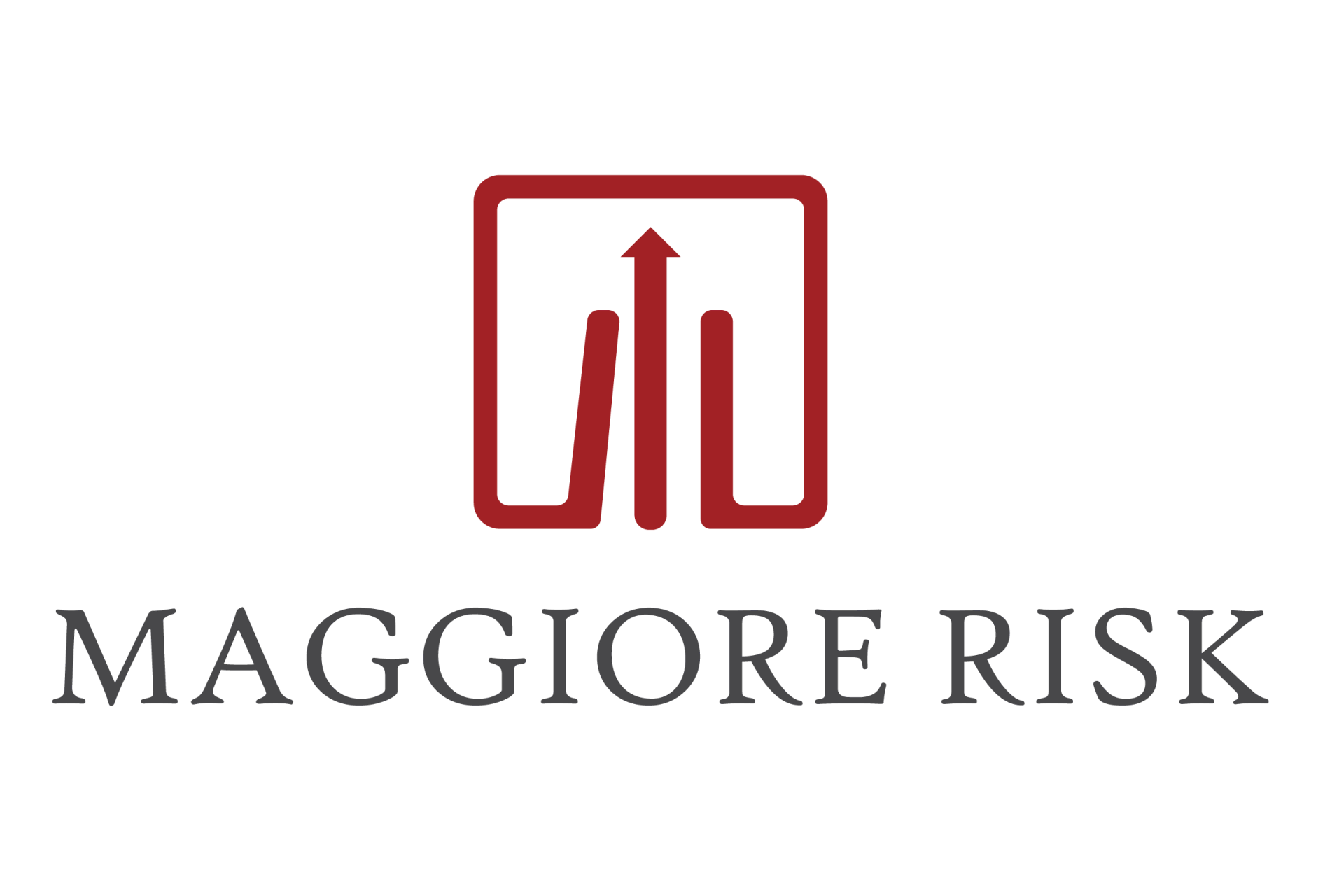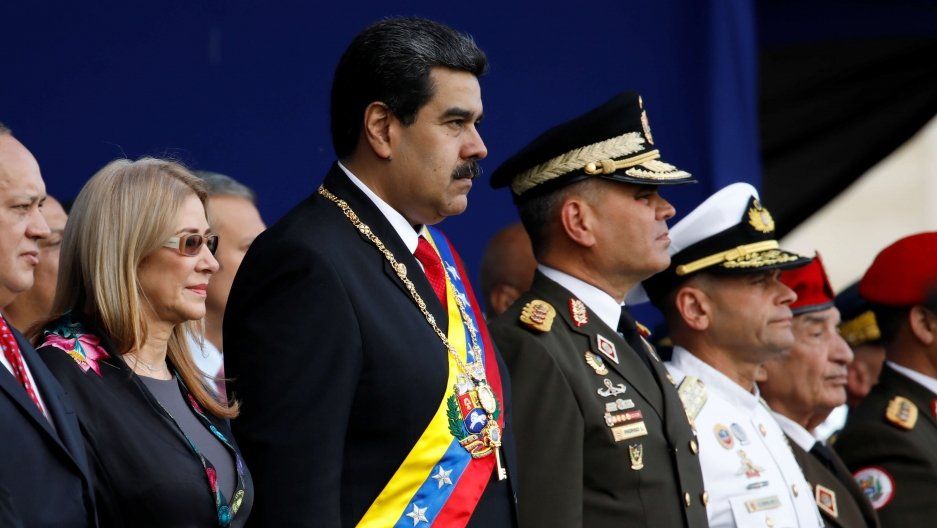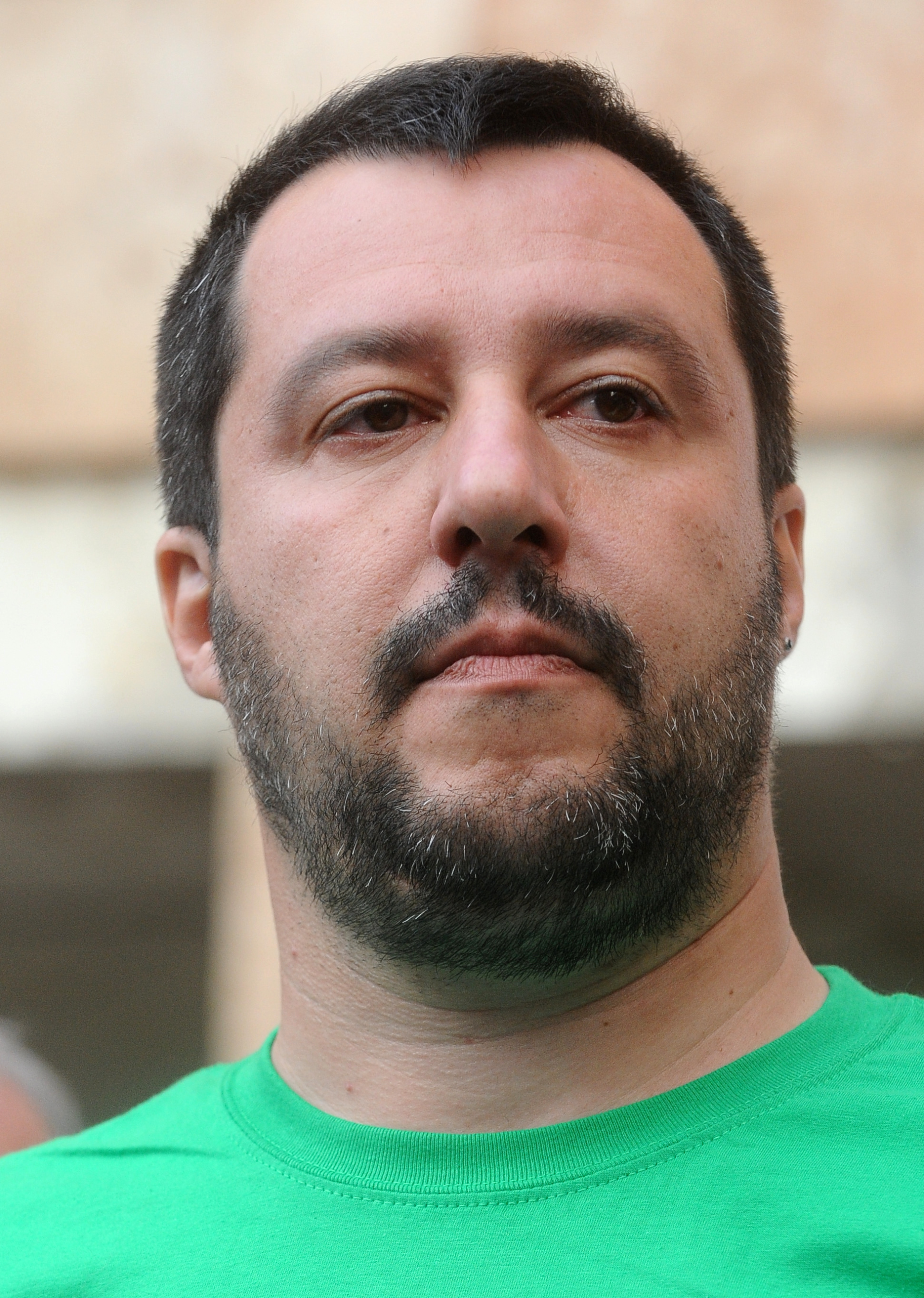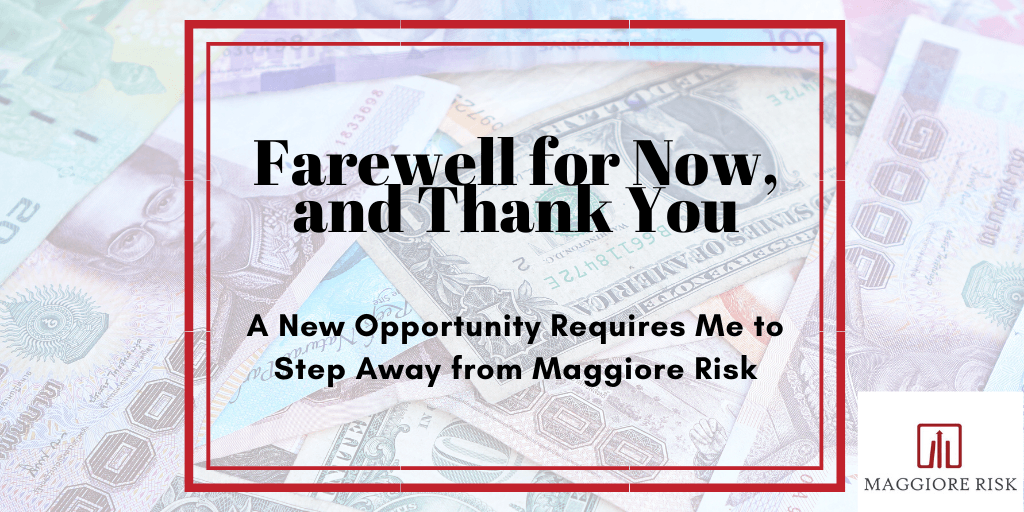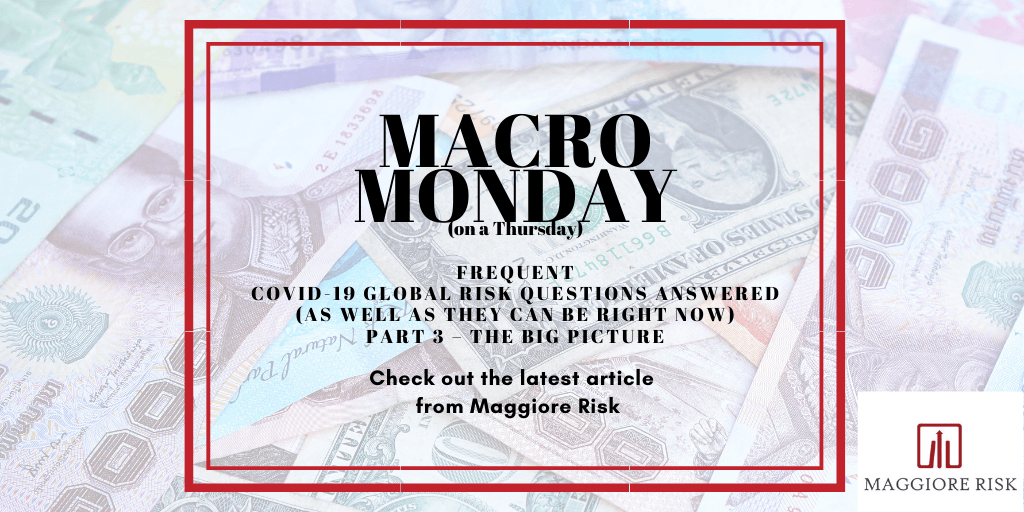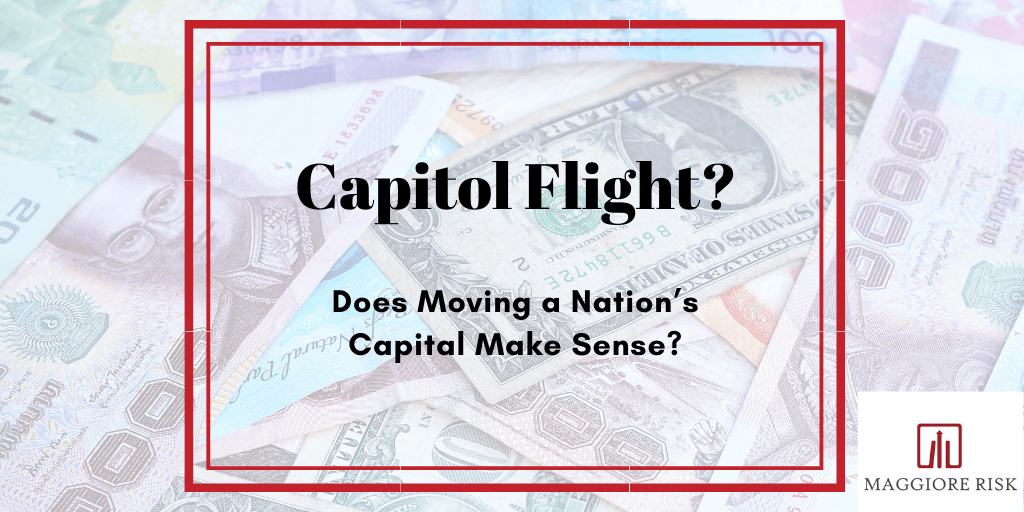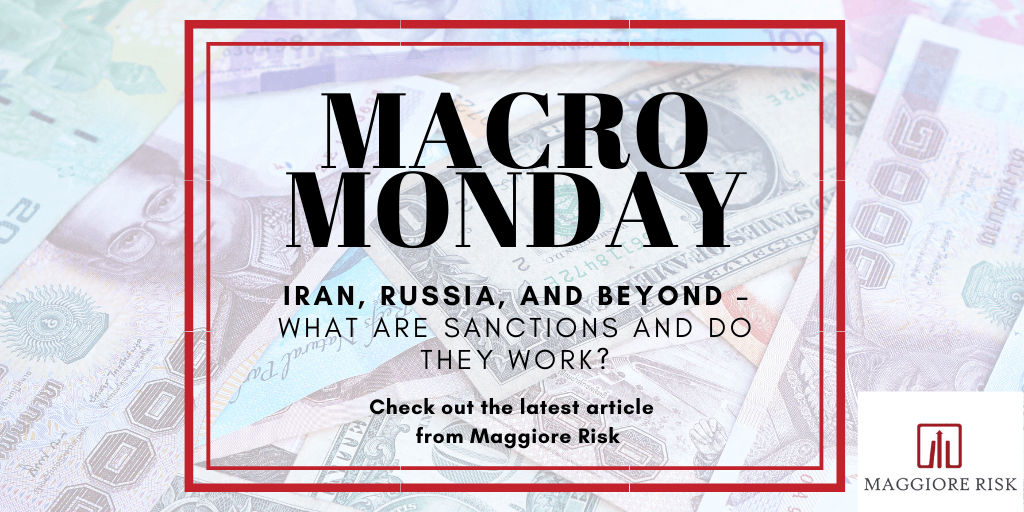Top 20 Global Risks of 2020
Kevin Rejent • December 1, 2019
U.S. political volatility, deepfake technology, and developing cracks in the Chinese system headline Maggiore Risk’s Top 20 Global Risks of 2020.

With a potentially slowing global economy, governments behaving badly, and cooperation between traditional trading partners and allies at an all-time low, the risks confronting the world’s political and economic systems are diverse and growing. Frayed relationships will make these challenges more difficult to manage, and domestic political concerns further complicate efforts to collectively solve global problems. These are the major risks we see challenging business and political leaders in 2020.
20. Chinese/South Korean Cooperation
– Soon after the US demanded that it triple its contribution to US forces on the Korean peninsula, South Korea struck an agreement to deepen military and intelligence ties with China. How will this be received in Pyongyang, Tokyo, and D.C.?
19. Turkish Instability – Turkey is attempting to serve as a stabilizing force in a volatile region. However, the economy and currency are stumbling while President Recep Tayyip Erdoğan tightens his grip on power by placing party lackeys and relatives in important roles. Can he hold it together long enough for the economy to turn around and lessen social pressures?
18. Canadian Real Estate Crash – In 2016 and 2017, the Canadian real estate market experienced unprecedented growth, with annual real price gains of 8.6% and 9.8%. The Canadian government feared a bubble was forming, so it tightened lending standard while the Bank of Canada raised interest rates. If this isn’t enough for an orderly deflation of the bubble, a pop could reverberate through the Canadian, American, and some Asian economies.
19. Turkish Instability – Turkey is attempting to serve as a stabilizing force in a volatile region. However, the economy and currency are stumbling while President Recep Tayyip Erdoğan tightens his grip on power by placing party lackeys and relatives in important roles. Can he hold it together long enough for the economy to turn around and lessen social pressures?
18. Canadian Real Estate Crash – In 2016 and 2017, the Canadian real estate market experienced unprecedented growth, with annual real price gains of 8.6% and 9.8%. The Canadian government feared a bubble was forming, so it tightened lending standard while the Bank of Canada raised interest rates. If this isn’t enough for an orderly deflation of the bubble, a pop could reverberate through the Canadian, American, and some Asian economies.
17. Stalled Saudi Reform
– A disappointing IPO of its state oil company would be the next in a line of disappointing results in Crown Price Mohammed Bin Salman’s (above) efforts to transform the Saudi economy, society, and neighborhood. With arrest and/or murder probably no longer options for dissidents, can discord be effectively contained in such a chaotic region?
16. Argentina Default – Incoming left-wing populist president Alberto Fernandez is much less concerned about paying the nation’s bondholders than previous conservative President Mauricio Macri. Any default would cut off Argentina’s access to international capital markets and harm the overall South American economy.
15. Sub-Prime Securitization…Again – Banks are bundling subprime loans and selling them in bulk as securitized products. Sound familiar? Only this time it’s auto loans instead of mortgages. Banks claim they learned their lesson and have made these products less volatile; but with loan defaults on the rise, can these products hold together or will we see another explosion of bad debt dragging down the economy?
16. Argentina Default – Incoming left-wing populist president Alberto Fernandez is much less concerned about paying the nation’s bondholders than previous conservative President Mauricio Macri. Any default would cut off Argentina’s access to international capital markets and harm the overall South American economy.
15. Sub-Prime Securitization…Again – Banks are bundling subprime loans and selling them in bulk as securitized products. Sound familiar? Only this time it’s auto loans instead of mortgages. Banks claim they learned their lesson and have made these products less volatile; but with loan defaults on the rise, can these products hold together or will we see another explosion of bad debt dragging down the economy?
14. Putin Meddling
– There is absolutely no question that Vladimir Putin will try to influence the US elections and stir chaos around the globe. Will the rest of the world effectively fight it off and punish Russia in a manner that makes Putin think twice about continuing his interference?
13. German Stagnation – The economic engine of the Eurozone has been hit hard by global trade tensions. Will is alter its trade and fiscal policies to deal with an economic slowdown or try to weather any storm using the same policies? The consequences of its decision will reverberate throughout Europe and the world.
13. German Stagnation – The economic engine of the Eurozone has been hit hard by global trade tensions. Will is alter its trade and fiscal policies to deal with an economic slowdown or try to weather any storm using the same policies? The consequences of its decision will reverberate throughout Europe and the world.
12. Sahel Terrorism
– Sub-Saharan Africa, particularly the central and western portions of the Sahel region (Mali, Niger, Chad) has seen a marked increase in terrorism the past few years as Boko Haram, al Qaeda, and others have flourished in the area. In addition to ending the tragedies suffered by residents of the area, western nations have concentrated efforts on the region to prevent the spread of extremism and flow of terrorists into Europe.
11. Indian Backsliding – Prime Minister Modi’s BJP Party took power with promises of economic transformation, but has recently been focused on Hindu nationalism as the economy has cooled. Can Modi return to a focus on economic development, or will he continue to be distracted by religious issues that harm economic and social progress?
__________________________________________________________________________________
11. Indian Backsliding – Prime Minister Modi’s BJP Party took power with promises of economic transformation, but has recently been focused on Hindu nationalism as the economy has cooled. Can Modi return to a focus on economic development, or will he continue to be distracted by religious issues that harm economic and social progress?
__________________________________________________________________________________
10. Venezuelan Death Throes
– It’s not really a question of “if”, but rather “when” and “how” Venezuela’s corrupt regime will finally collapse. President Nicolas Maduro is widely viewed as a buffoon who retains power by lavishing the political and military elite with luxury while the Venezuelan people go without basic necessities such as food and medicine. There is a chance that Maduro would accept asylum in a friendly nation (Cuba? Russia?) and leave voluntarily since even his allies are not interested in providing Venezuela with any more economic lifelines; but more than likely he will need to removed by a military that turns on him or a popular revolt that is yet to materialize. There is real concern that he will lash out at anyone he feels is responsible or any nation that will rally his supporters. Attacks on American, Colombia, and Brazilian interests could produce significant damage.
9. Brexit – This has been near to top of every political risk list for the past several years. However, the markets appear to have mostly priced in the risks by now, so its significance has decreased. Additionally, the exit scenarios have been batted around for so long that affected businesses and nations have (hopefully) had enough time to plan for each contingency. Volatility resulting from any dramatic deviations from the currently understood scenarios is the primary Brexit risk heading into 2020.
8. North Korean Temper Tantrum – Kim Jong Un did not get the diplomatic breakthrough that he wanted with the United States, so he has returned to the traditional North Korean strategy of spewing extreme rhetoric and stepping up missile tests and military preparations. Quite frankly, he is running out of options. His Hail Mary attempt to charm President Trump into removing sanctions without demanding denuclearization failed, and he now sees his greatest enemy on one border (South Korea) strengthen ties with his patron state on another border (China)(see Risk #20). If he feels pinned in and losing control, he may lash out, either at Japan to garner support from the South Korean population or the US to inflict the largest symbolic damage before his inevitable fall. Keeping pressure on North Korea to reform without triggering a military incident will take tremendous skill on the part of regional actors and the United States.
9. Brexit – This has been near to top of every political risk list for the past several years. However, the markets appear to have mostly priced in the risks by now, so its significance has decreased. Additionally, the exit scenarios have been batted around for so long that affected businesses and nations have (hopefully) had enough time to plan for each contingency. Volatility resulting from any dramatic deviations from the currently understood scenarios is the primary Brexit risk heading into 2020.
8. North Korean Temper Tantrum – Kim Jong Un did not get the diplomatic breakthrough that he wanted with the United States, so he has returned to the traditional North Korean strategy of spewing extreme rhetoric and stepping up missile tests and military preparations. Quite frankly, he is running out of options. His Hail Mary attempt to charm President Trump into removing sanctions without demanding denuclearization failed, and he now sees his greatest enemy on one border (South Korea) strengthen ties with his patron state on another border (China)(see Risk #20). If he feels pinned in and losing control, he may lash out, either at Japan to garner support from the South Korean population or the US to inflict the largest symbolic damage before his inevitable fall. Keeping pressure on North Korea to reform without triggering a military incident will take tremendous skill on the part of regional actors and the United States.
7. Massive Data Hack
– Of course everyone is concerned about cybersecurity; but while annoying and time consuming, most data breaches are intended to steal information for profit. What would happen if a powerful actor (maybe a state like North Korea or Iran) pulls off a data breach on a scale never before seen and with a goal of disrupting life as much as possible? In addition to economic pandemonium, such an attack could result in a war since most nations view cyber-attacks as a similar level of hostility as a physical attack. In our connected world with the technology of both the good guys and bad guys improving every minute, the risk of this type of conflict is constantly rising.
6. Crumbling Trade System – President Trump’s trade war with China and dust up with virtually all other trading partners are slowing global growth, and with only minor agreements in sight, are likely to continue to impact economies. In an election year, President Trump will either want to finalize several agreements quickly to show that he is the dealmaker he claimed to be in 2016 or stir up more discord to demonstrate concern for American manufacturers. Combine this with Brexit uncertainty and slowdowns of the Chinese and German economies and you have a recipe for global economic trouble.
5. Iranian Activism – The reinstatement of sanctions after the United States’ withdrawal from the JCPOA has hit Iran’s economy hard. The nation is cut off from most normal banking arrangements and has difficulty selling its oil. Recent protests, ostensibly caused by an increase in fuel costs but more related to the overall state of the Iranian economy, resulted in over 140 deaths and a brief shut down of Iranian internet. With no relief from sanctions in sight, Iran is likely to take a more active role in black market activities such as cybercrime and illegal oil sales. Additionally, as its recent attack on Saudi oil facilities and proxy wars in Yemen and Syria demonstrate, Iran is willing to use its strong military to project its power and express its frustrations. And let us not forget their nuclear ambitions, with most experts believing Iran could possibly enrich uranium to the necessary purity within one year since it is no longer constrained by the JCPOA.
6. Crumbling Trade System – President Trump’s trade war with China and dust up with virtually all other trading partners are slowing global growth, and with only minor agreements in sight, are likely to continue to impact economies. In an election year, President Trump will either want to finalize several agreements quickly to show that he is the dealmaker he claimed to be in 2016 or stir up more discord to demonstrate concern for American manufacturers. Combine this with Brexit uncertainty and slowdowns of the Chinese and German economies and you have a recipe for global economic trouble.
5. Iranian Activism – The reinstatement of sanctions after the United States’ withdrawal from the JCPOA has hit Iran’s economy hard. The nation is cut off from most normal banking arrangements and has difficulty selling its oil. Recent protests, ostensibly caused by an increase in fuel costs but more related to the overall state of the Iranian economy, resulted in over 140 deaths and a brief shut down of Iranian internet. With no relief from sanctions in sight, Iran is likely to take a more active role in black market activities such as cybercrime and illegal oil sales. Additionally, as its recent attack on Saudi oil facilities and proxy wars in Yemen and Syria demonstrate, Iran is willing to use its strong military to project its power and express its frustrations. And let us not forget their nuclear ambitions, with most experts believing Iran could possibly enrich uranium to the necessary purity within one year since it is no longer constrained by the JCPOA.
4. Corporate Debt Bomb
– Low interest rates are vital to stimulate investment in challenging economic times. However, they also allow inefficient companies access to what is close to free money to remain in operation when the best thing for the economy would be for them to shut down and release their capital and talent back into the market. An additional $60 trillion in debt has come into existence in the post-financial crisis low interest rate world, much of it in the private corporate sector. Economists have been worried about this potential bubble for years, and the risk will grow larger if the global economy slows in 2020 and over-extended companies are unable to satisfy their obligations.
3. Chinese System Cracks – The Chinese system has been built on an agreement between the people and government that the government would deliver wealth and, in exchange, the people would not challenge its authority. However, the history of all nations is that, as the people obtain wealth and a middle class develops, they demand more political and social rights. With the Chinese economy slowing down, middle class wealth accumulation has stalled, and Chinese citizens are starting to question their government more. Further, the protests in Hong Kong challenge the “One Nation, Two Systems” principle that has been accepted since the transfer of Hong Kong to Chinese control. While the Communist regime is not on the edge of collapse, how it addresses the rising angst will indicate whether it will attempt to evolve or dig in.
2. Deepfake Tomfoolery – Deepfake technology, or technology used to produce or alter video content so that it shows something that didn't actually occur, is evolving quickly and, in the wrong hands, has the potential to stir up trouble. Imagine, if you will, video of a presidential candidate disparaging a large group of voters on a “hidden camera” video that is actually the creation of a partisan from the other side. Or imagine an incredibly believable video of a western leader blaspheming the Prophet Mohammed and stating that mosques should be burned making rounds through the Islamic world. As the technology advances, so must the ability to credibly identify deepfakes and quickly demonstrate their false nature to the viewing public.
3. Chinese System Cracks – The Chinese system has been built on an agreement between the people and government that the government would deliver wealth and, in exchange, the people would not challenge its authority. However, the history of all nations is that, as the people obtain wealth and a middle class develops, they demand more political and social rights. With the Chinese economy slowing down, middle class wealth accumulation has stalled, and Chinese citizens are starting to question their government more. Further, the protests in Hong Kong challenge the “One Nation, Two Systems” principle that has been accepted since the transfer of Hong Kong to Chinese control. While the Communist regime is not on the edge of collapse, how it addresses the rising angst will indicate whether it will attempt to evolve or dig in.
2. Deepfake Tomfoolery – Deepfake technology, or technology used to produce or alter video content so that it shows something that didn't actually occur, is evolving quickly and, in the wrong hands, has the potential to stir up trouble. Imagine, if you will, video of a presidential candidate disparaging a large group of voters on a “hidden camera” video that is actually the creation of a partisan from the other side. Or imagine an incredibly believable video of a western leader blaspheming the Prophet Mohammed and stating that mosques should be burned making rounds through the Islamic world. As the technology advances, so must the ability to credibly identify deepfakes and quickly demonstrate their false nature to the viewing public.
1. U.S. Elections/Impeachment
– Putting the United States at the top of this list is certainly unusual, and every effort was made to move it down; but the volatility that the Trump administration unleashes even on a normal day (usually on Twitter), combined with the potential Constitutional crises (yes, more than one potential crisis) make this placement unavoidable. Add to that the uncertainty of who will be leading the nation in 2021, and investors could not be blamed for keeping their money on the sidelines until there is more clarity. The philosophical reason it rises to the top of the list is simple: if the institutions of the most stable democracy the world has ever known can be shaken so quickly by so few people in power, what does this say about the stability of less-established nations?
Of course, the world is increasingly connected, so these events would not occur in a vacuum, and the occurrence of one could lead to the occurrence of another. Similarly, solving one problem may prevent another from occurring. This is not a list of doomsday prophecies or ways in which the world ends. The world isn’t going crazy…it was born that way, and we have, for millennia, done the best we can to address challenges, manage risk, and move forward. The entirety of human history indicates that we will continue to do so only, hopefully, a little better each time.
Of course, the world is increasingly connected, so these events would not occur in a vacuum, and the occurrence of one could lead to the occurrence of another. Similarly, solving one problem may prevent another from occurring. This is not a list of doomsday prophecies or ways in which the world ends. The world isn’t going crazy…it was born that way, and we have, for millennia, done the best we can to address challenges, manage risk, and move forward. The entirety of human history indicates that we will continue to do so only, hopefully, a little better each time.
